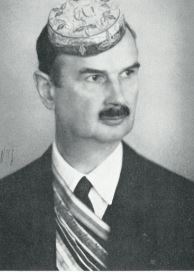Dr. Heinrich Prinz zu Schwarzenberg

Personalia
Born:
Died:
Profession:
Persecution:
Imprisonment 28.10.1943 - 28.01.1944, Buchenwald concentration camp 28.01.1944 - 19.07.1944
KZ Number:
Memberships
Curriculum Vitae
Heinrich Prinz zu Schwarzenberg, who came from a noble family, attended various schools and grammar schools in the area of the old monarchy as the son of a k. u. k. Major General, he attended various schools and grammar schools in the area of the old monarchy. Pressburg [Bratislava], Vienna, Lernberg [Lwiw], Pardubitz [Pardubice] (Eastern Bohemia), Stanislaus [Stanislawow] (Galicia), Brandweis/Eibe [Brandys] (Bohemia), Budweis [Ceske Budejovice], St. Paul im Lavanttal [St. Paul in the Lavant Valley] before he graduated from Kollegium Kalksburg in 1922. He then began studying law in Vienna and went to Innsbruck in the third semester, where he was accepted into the student fraternity Austria Innsbruck in 1923. From this point onwards, his life was shaped by Catholic student life.
In 1927, together with others, he founded the student fraternity Rheno-Danubia in Innsbruck. He was also active on pennal soil, with the middle school fraternity Cimbria Innsbruck making him one of their own as early as 1924. After graduating as Dr. iur. in 1928, Heinrich Prinz zu Schwarzenberg began working as a trainee at the Tyrolean provincial government and soon found his way to the Heimatschutz in accordance with his origins and convictions. He co-founded the VF in Tyrol.
In 1933, Heinrich Prinz zu Schwarzenberg transferred to the Foreign Service in Vienna and was posted to the Austrian legations in Budapest and Rome for short periods. In 1934, he became secretary to the Minister of Education, Dr. Hans Pernter. In 1936, compulsory military service is introduced in Austria. As the oldest one-year volunteer, he served in the Austrian Armed Forces (artillery) in 1937/38 and thus escaped the wave of persecution in the first days after the Anschluss by joining the German Armed Forces. In September 1938, he was discharged from the Wehrmacht, having previously been a civil servant.
After Adolph Prince zu Schwarzenberg (1890-1950) was forced to emigrate abroad as an opponent of the Nazi regime, he entrusted Heinrich Prince zu Schwarzenberg with the administration of the estate. When he made a trip to Italy as the general representative of the Schwarzenberg family estates (Schwarzenberg'sches I. Majorat), he was classified as "hostile to the Reich" in his absence and denied re-entry to "Greater Germany". His possessions, including those in the Protectorate of Bohemia and Moravia, are confiscated. Heinrich Prinz zu Schwarzenberg remains in Italy, but after the fall of Benito Mussolini following the Badoglio ceasefire agreement of September 3, 1943, he is arrested on October 28, 1943 by the Gestapo, which has penetrated Italy, on Heinrich Himmler's instructions and taken via Genoa, Milan, Verona, Innsbruck and Linz to the concentration camp in Buchenwald on January 28, 1944. Thanks to the intervention of friends, he was released from the concentration camp shortly before the great wave of arrests following the July 20, 1944 assassination attempt on Adolf Hitler on July 19, 1944. He was forcibly conscripted to work in an armaments factory in Linz and remained there until the end of the war.
Places
Persecution:
Residence:
Citations
- Krause, Peter/Reinelt, Herbert/Schmitt, Helmut (2020): Farbe tragen, Farbe bekennen. Katholische Korporierte in Widerstand und Verfolgung. Teil 2. Kuhl, Manfred (ÖVfStG, Wien), p. 317/318.
